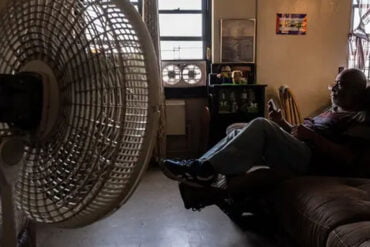Climate scientist Stan Cox is urging Americans to reconsider their reliance on air conditioning, particularly during the sweltering summer months, as part of the global fight against climate change.
Cox, the author of Losing Our Cool: Uncomfortable Truths About Our Air-Conditioned World and The Green New Deal and Beyond: Ending the Climate Emergency While We Still Can, highlights the environmental cost of air conditioning. “The greenhouse gases emitted by the nearly 90% of American households that use AC are exacerbating the climate crisis, even when units are running in relatively mild weather,” he warns.
Cox points out that air conditioning and refrigeration contribute to more than 10% of the world’s total greenhouse gas emissions, a figure projected to double over the next 25 years. “If this happens,” Cox wrote in a June 2024 piece, “global efforts to meet the UN’s climate targets will be even more derailed.”
He describes this situation as a “feedback loop from hell,” and has personally endured 25 summers without air conditioning. Instead, Cox and his wife rely on electric fans and regularly mist themselves with water to stay cool. “A quick cold shower or time under the lawn sprinkler can also offer relief,” he suggests.
Beyond environmental concerns, Cox notes the social impact of widespread AC usage. “Before air conditioning became widespread, front porches, parks, and playgrounds were full of life on summer evenings. Today, those spaces are often deserted in favor of air-conditioned interiors.”
To further reduce their environmental impact, Cox advises people to minimize humidity-inducing activities, like using dishwashers, and keep refrigerators at the highest possible setting without risking food spoilage.
Cox believes that people can gradually adjust to living without air conditioning. “Human beings evolved under a wide range of climatic conditions, and we haven’t lost the ability to adapt. Studies show that, over time, people can get used to higher temperatures that initially feel unbearable.”
Having started his career with the US Department of Agriculture, Cox now serves as the Ecosphere Fellow at the Land Institute. Beyond his critiques of air conditioning, he has also labeled the US military a key “enemy” in the battle against climate change.
Author’s Note: While Cox’s arguments are compelling, the idea of forgoing air conditioning isn’t feasible for everyone, especially as heat waves grow more extreme in many parts of the world. Even Cox admits that his methods won’t work universally, acknowledging that his situation—living in a shaded small town in Kansas with access to parks and a cool basement—provides advantages not available to many.







